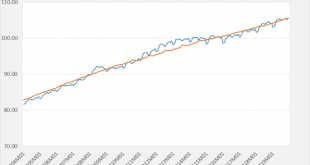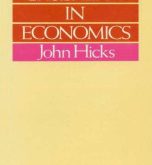from Blair Fix I confess that I have a recurring nightmare. In it, I realize that everything I’ve ever written about economics is wrong. Neoclassical economics is not, as I’ve repeatedly claimed, a pile of bullshit. In this nightmare, neoclassical economics is correct. And as a strident critic of neoclassical theory, I realize the horrible truth. I’m a crank! I wake up in a cold sweat, wondering if I’m wasting my life. Then, as rational thought returns, my fears ebb away. I think about...
Read More »Costs of owner occupied houses should be in the price index. But in the right way.
The ECB rightly wants to pay more attention to costs of ‘owner occupied houses’ (OOH) when it comes to inflation. Statisticians often use ‘imputed rents’ to do this. The ECB shouldn’t do this but should look at actual costs of owners of houses. Rents and monetary costs of OOH do not develop in the same way. Also, rented houses are not inhabited by the same social and demographic groups as owner occupied houses. Which means that using rents to gauge the costs of OOH, as happens in many...
Read More »Hicks on the limited applicability of probability calculus
from Lars Syll When we cannot accept that the observations, along the time-series available to us, are independent, or cannot by some device be divided into groups that can be treated as independent, we get into much deeper water. For we have then, in strict logic, no more than one observation, all of the separate items having to be taken together. For the analysis of that the probability calculus is useless; it does not apply. We are left to use our judgement, making sense of what has...
Read More »Economics awaits a Darwinian revolution
from Blair Fix and RWER issue #90 Modern economics, I have come to believe, resembles pre-Darwinian biology. By this, I mean that economics is captivated by an ideology that is stopping scientific progress. Let’s look at the parallels. Before Darwin, biologists believed that life on Earth was created by God. This seductive idea stunted scientific progress for centuries. Much of the evidence for evolution – the fossil record, the similar anatomy of different species – was staring...
Read More »Open thread Feb. 4, 2020
A policy-makers toolkit for state-backed digital currencies: do we need this?
from Maria Alejandra Madi Since the 2008 global financial crisis, the financial regulation scenario faces new drivers and challenges. Bank transactions by internet and mobile banking have sharply increased. In this digital environment, new technologies – such as advanced analytics, big data, in addition to the use of robotics, artificial intelligence, new forms of encryption and biometrics – have been enabling changes in the provision of financial products and services. The current wave...
Read More »The knowledge of childless philosophers
from Asad Zamzn Continuing from the previous post on The WHY of Crazy Models, I attribute a large portion of the blame to massively wrong theories of knowledge. A little bit of study of epistemology is enough to give anyone a headache. Because of this, instead of investing the time and effort to decipher what the philosophers are saying, the rest of us are willing to take it on faith. No one is aware of the massive amount of damage done by philosophers – most philosophers themselves are...
Read More »40 years of wage redistribution in the USA
The statistical significance of focus groups
I’ve generally taken a pretty dim view of focus groups, which seem to be used mostly to detect and amplify unthinking prejudices. But, I have to admit, that probably is due at least in part to the fact that my prejudices aren’t very close to those of the median focus group participant. So, it wasn’t until I saw focus group results matching my own thoughts that I paid any attention to the question of whether the results actually meant anything. According to the SMH report,...
Read More »Chicago economics — where do we unload the garbage?
from Lars Syll There is also a practical problem, if economics as a discipline is to survive. There is a huge amount of junk in the peer-reviewed economics literature -– the reviewing process is no protection when the reviewers themselves are prejudiced. A comparison that comes to mind is the collapse of “scientific” eugenics. There were vast amounts of that written, and now it is only read as an object example of the capture of a social science by prejudice and authoritarianism. For...
Read More » Heterodox
Heterodox





